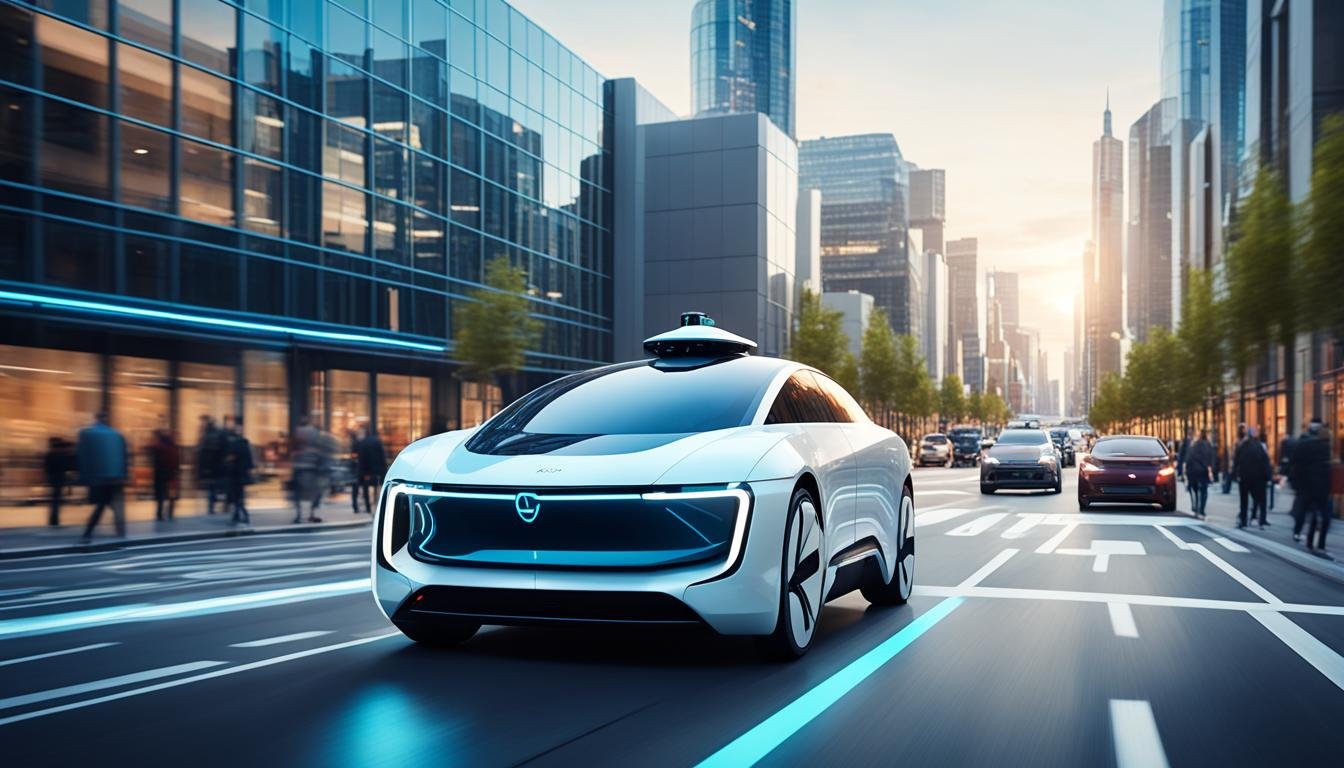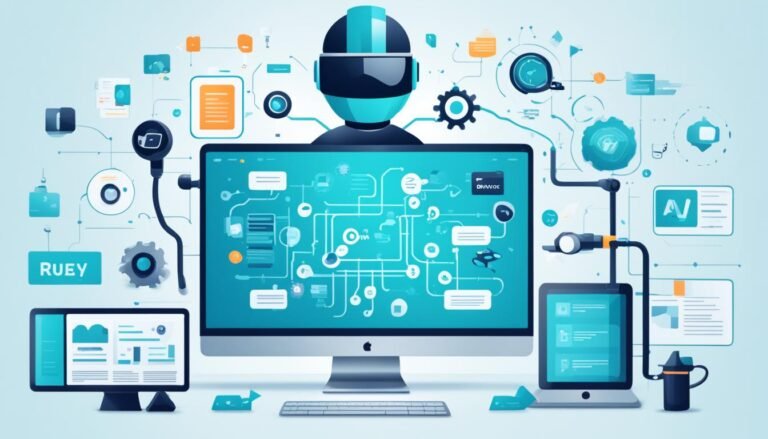AI in Transportation: From Autonomous Vehicles to Smart Logistics
Have you ever thought about how technology could change whole industries? Picture cars that drive themselves and a world where the traffic always moves smoothly. This is the vision that AI has for the transportation industry. In 2022, the global automotive AI market reached nearly $3 billion. This shows how fast AI is growing and its big role in our future.
Artificial intelligence is making big changes in transportation. It’s helping to use roads better and keep people safe. Things like 5G, IoT, and cloud computing are pushing these changes further. With their help, transportation is becoming more joined up, efficient, and secure. Self-driving cars and smart ways to fix vehicles before they break down are just the start of AI’s impact.
Key Takeaways
- The global automotive AI market had a capitalization of nearly $3 billion in 2022.
- AI helps reduce traffic congestion, financial expenses, and carbon emissions in the transportation sector.
- Autonomous vehicles are a pivotal use case, addressing the rising demand for self-driving cars.
- AI-based predictive maintenance detects issues early, resulting in enhanced safety and cost savings.
- Customer service chatbots in transportation can enhance efficiency and deliver personalized user experiences.
The Evolution of AI in the Transportation Industry
The transportation industry has seen nonstop innovation from 1787’s steamboats to today’s self-driving cars. Across time, key advancements like bicycles in the 1800s and cars and planes in the 1900s shaped our modern world. These advances formed the basis for AI’s crucial role in today’s transportation.
Historical Milestones
Since its start, transportation has advanced through key technological leaps. The steamboat changed marine travel, and bicycles made personal transport common. With cars and planes in the 20th century, global travel became easier than ever before.
These breakthroughs prepared the way for today’s AI in transportation, with a nearly $3 billion market in 2022. Now, autonomous vehicles, previously only in sci-fi, are a reality on our streets.
Modern Advancements
Modern transportation is making big progress, thanks to AI. From better traffic flow to save money and cut down on pollution, AI is at the heart of it. It also helps keep vehicles safe and operations smooth.
Take Tesla’s Autopilot, for example. It shows us how AI tech lets cars move through tricky spaces with little human help. Or how UPS uses AI for smarter delivery routes, making things more efficient and aware of the environment.
This journey isn’t over yet. The patterns set by transportation’s past show us where AI will lead us next. It’s not just boosting what we have; AI is paving the way for future travel. It’s at the core of innovation in transportation.
The Global Impact of AI on Transportation
Artificial Intelligence (AI) has changed the automotive world in enormous ways. It has made transportation better in ways we didn’t think possible. AI helps make moving things around more efficient and it boosts how well vehicles run.
Market Valuation and Growth
In 2023, the AI market valuation for transportation hit a huge $3 billion. Experts see this number climbing even higher. They predict a 25.5% yearly growth between 2023 and 2030.
Technological Contributions to the Sector
AI does a lot more than drive cars or trucks. It uses traffic data to cut travel time by up to 25% and save fuel by 10-15%. McKinsey found this out. And, AI also knows when vehicles need fixing before they even break.
Smart logistics thanks to AI mean routes are perfect and things arrive on time. This means costs drop. It’s not just vehicles; AI makes storage smart too. Robots help keep track of items better, which means less waste or not having enough.
AI makes shipping more clear and helps customers know where their stuff is. This brings a lot more trust and keeps things running smoothly. AI’s crystal ball in predicting needs also helps make sure there are no bumps in the road.
The world of transportation is getting bigger and smarter. Thanks to AI, people and technology team up to solve problems and make things work better. This is the start of an exciting time of growth and new ideas in the AI for transportation sector.
Autonomous Vehicles: A Closer Look
Autonomous vehicles (AVs) are changing the way we move, making it safer and more efficient. They use high-tech sensors and analyze data in real time. This tech helps cut down on accidents, mainly by countering the risks of distracted driving. With self-driving cars, we aim to make our streets less crowded and our air cleaner, greatly improving city life.
Safety and Efficiency Enhancements
AVs bring a big leap in safety on our roads. They can read road signs and react to changes on their own, cutting down on mistakes people make. This means less chance of accidents. Special AI algorithms help these cars make quick, smart decisions, keeping everyone safer and reducing accidents.
Challenges and Roadblocks
But, using AVs everywhere faces some hurdles. They cost a lot to make and meet strict laws. There’s also worry about how safe they are for people walking. Making the public trust these cars is hard, made worse by concerns about who’s responsible if something goes wrong. Because they’re pricey, we might see them owned by groups instead of individuals, changing how we use them.
Real-world Examples
Real examples show us the big impact AVs can have. Since 2009, Waymo has been at the forefront with its self-driving fleet. Tesla followed in 2014 with its “Autopilot” technology. These steps prove we’re on our way to making AVs a normal part of our daily lives. We’re working towards a future with less traffic, fewer accidents, and more efficiency.
Faster Response to Emergencies Through AI
Artificial intelligence (AI) is making our roads safer. It plays a big role in emergency response, helping send alerts to the right services after accidents. This means help arrives much faster, saving lives. It also helps lower the chances of severe injuries.
Thanks to AI, sending out emergency alerts is now automatic. This means vital info gets to first responders right away.
But AI’s work isn’t just in emergencies. It’s part of a big effort to make our roads safer. AI sends out updates and warnings in real time. It keeps an eye on roads and how people are driving to prevent accidents. So, AI’s making our transport systems safer all the time.
This tech is also good for our wallets and comfort. AI in transportation cuts costs in emergencies. It makes riding in modern vehicles safer. These cars come with smart systems that make the ride personal.
But there’s more. AI also helps fight traffic and pollution. This is big for our planet. In short, AI is changing how we deal with emergencies and keep our roads safe. It’s key for a future that’s safe and runs better for everyone.
AI-Driven Smarter Traffic Management
The global automotive AI market has hit nearly $3 billion in 2022. It shows how AI is essential in making traffic better. AI uses real-time data to cut down on traffic jams, making travel smoother for everyone. This change to smarter traffic management shows AI’s big role in the future of how we move in cities.
Reducing Traffic Congestion
AI brings new ways to lessen traffic. It uses smart traffic lights and picks the best routes to make traffic flow better. This helps cut down on waiting in traffic, which makes getting around cities easier. Plus, it lowers harmful emissions and saves money by not wasting fuel while sitting in traffic.
Real-time Traffic Updates
One of AI’s best parts is giving us updates on traffic right when we need them. These updates tell us about dangers and changes in traffic. With this fresh info, we can change our paths quickly, making our trips smoother. This reduces accidents and makes traveling safer for everyone.
Enhancing the Driving Experience with AI
AI has changed how we drive, offering more personalized and safer experiences. Vehicles with AI make journeys smoother and more fun for everyone onboard.
Personalized User Experiences
AI excels at creating personalized transportation experiences. It customizes infotainment and finds the best routes that fit the driver’s style. This means every journey meets the unique needs of the people involved. By learning from past trips, AI gets better at knowing what the user likes, making the drive more intuitive and fun.
Driver Assistance Systems
AI also boosts safety through driver assistance systems. These use advanced tech like machine learning and smart sensors. Driver assistance AI features include smart cruise control, staying in your lane, and parking by itself. Besides making driving easier, these systems cut down on mistakes, keeping everyone safer. Plus, as tech grows, we’ll see even cooler safety tools.
Predictive Maintenance for Vehicles and Infrastructure
AI has completely changed predictive maintenance in transportation. It focuses on solving problems before they cause big issues. It uses past data and real-time information to stop potential problems early, cutting down on downtime.
Proactive Detection of Issues
Predictive maintenance finds issues early in both vehicles and places like roads. This is key for stopping sudden breakdowns that can disrupt safety and cause big problems. With AI and machine learning, we can constantly check and fix problems before they become serious.
Cost Savings and Safety Improvements
Thanks to AI, predictive maintenance isn’t just about safety. It also saves a lot of money by avoiding major breakdowns. This lets businesses use their money smarter. Plus, it makes traveling safer and more reliable, saving costs in the long run.
Benefits of AI in Smart Logistics
Artificial Intelligence (AI) marks a new chapter in smart logistics. It changes how goods move and are managed. By predicting inventory levels and automating shipping, AI alters the transportation scene.
Optimizing Supply Chain Management
AI in supply chain management brings huge advantages. It uses predictive analytics to keep just the right amount of stock. This reduces surplus or shortages. By looking at past data and current trends, AI boosts demand predictions. This helps businesses run smoother.
Moreover, AI tools make route planning and navigation automatic. This cuts fuel use, speeds up deliveries, and makes supply chains more productive.
Autonomous Freight Solutions
Autonomous freight tech is a key breakthrough. It lets AI-powered vehicles move goods without any human help. This lowers costs and avoids mistakes. These self-driving solutions also make roads safer by cutting down on accidents. As AI grows, we dream of a day when logistics run completely on their own. This would mean more dependable and eco-friendly freight movement.
In sum, AI brings multiple perks to smart logistics. It improves supply chain handling and introduces auto freight tech. The sector is headed towards higher efficiency, safety, and green practices. With the AI market booming in the automotive sector, logistics is becoming smarter and more joined up.
Artificial Intelligence in Passenger Safety
Artificial intelligence (AI) plays a key role in making passengers safer. The global market for AI in cars will hit nearly $3 billion by 2022. This is bringing big changes to how we keep people safe in public transportation.
AI can find dangers as they happen and tell drivers right away. This lets them act fast to avoid accidents. It also keeps an eye on how drivers act, teaching them to drive safer. This shows how AI is making public transport better and safer for everyone.
Predictive maintenance powered by AI makes sure vehicles don’t break down easily. It finds and fixes problems before they become big issues. This helps save money and keeps transport safer. Self-driving cars show how AI uses big data to make travel safer too.
AI also helps set insurance prices based on how well someone drives. This makes the whole transport system handle problems better, saving money and working more smoothly. A McKinsey report says self-driving cars can cut costs by 45%. This shows that using AI means big savings and safety boosts.
As AI keeps getting better, it will make travel safer and more efficient. We’re on a path to safer public transport with the help of AI in passenger safety.
AI in Transportation: From Autonomous Vehicles to Smart Logistics
AI is changing transportation in powerful ways. The autonomous vehicle and smart logistics sectors are growing fast, with a market cap nearly reaching $3 billion in 2022. These changes promise to lower traffic jams, costs, and harmful emissions.
The progress goes beyond just making things automatic. AI is helping by giving real-time traffic info to drivers, cutting down on accidents. It also helps spot possible vehicle issues early, saving money for transport companies.
AI even checks on how well drivers are doing on the road. It looks at things like how they brake, their speed, and if they follow traffic laws. This helps make driving safer, saves fuel, and makes routes more efficient.
Smart logistics are also getting a big boost from AI. Tools powered by AI can predict what items and services people will need, adjust stock levels, and improve delivery planning. This has led to more efficient freight systems, like self-driving trucks and drones, which cut labour costs and help the environment.
Source Links
- https://101blockchains.com/ai-in-transportation/
- https://medium.com/@aamiraftabcloud/ai-in-transportation-transforming-roads-routes-and-logistics-6ad4d5382dce
- https://startupnationcentral.org/blog/climatetech/ai-in-transportation-the-future-of-mobility/
- https://tlimagazine.com/news/is-the-transportation-industry-ai-ready/
- https://tcitransportation.com/blog/the-impact-of-artificial-intelligence-ai-on-transportation-logistics/
- https://www.linkedin.com/pulse/ai-transportation-advancing-mobility-solutions-2024-dave-balroop-stztc
- https://flatirons.com/blog/ai-in-transportation-industries/
- https://www.urbanismnext.org/technologies/autonomous-vehicles
- https://medium.com/@seekmeai/the-growing-role-of-ai-in-autonomous-vehicles-and-transportation-cdde81ae0565
- https://copperdigital.com/blog/rise-of-autonomous-vehicles-implications-transportation/
- https://appinventiv.com/blog/ai-in-transportation/
- https://syndelltech.com/ai-in-transportation/
- https://integrio.net/blog/benefits-of-artificial-intelligence
- https://www.modeshift.com/what-is-the-future-of-artificial-intelligence-ai-in-transportation/








